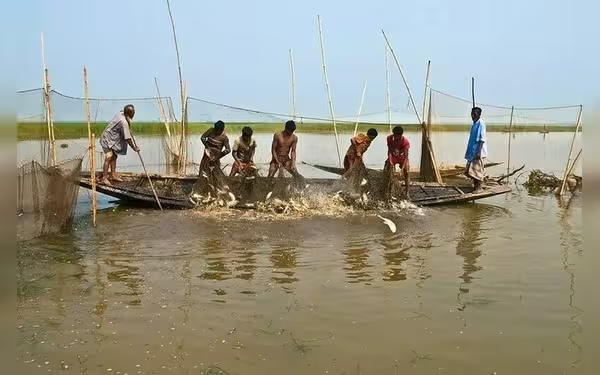Sunday, December 22, 2024 03:44 AM
Revitalizing Pakistan's Fisheries Sector for Economic Growth
- Pakistan's fisheries sector has immense untapped potential.
- Climate change and pollution threaten fish populations.
- Investment in sustainable practices can boost exports.
 Image Credits: brecorder
Image Credits: brecorderExplore the untapped potential of Pakistan's fisheries sector for economic growth and food security amidst challenges like climate change and pollution.
Pakistan’s fisheries sector is often overlooked, yet it holds immense potential for economic growth and food security. With a coastline stretching over 1,050 kilometers and abundant inland water resources, the country is well-positioned to become a significant player in the global fisheries market. However, despite generating over $534 million in export revenue annually and providing jobs for thousands in regions like Sindh and Balochistan, the sector remains underutilized and poorly managed.
The challenges facing this vital industry are numerous and interconnected. Climate change poses a significant threat to both inland and marine ecosystems. For instance, Manchar Lake in Sindh, once a bustling center for fish production, is now in decline due to pollution and rising temperatures. These environmental changes have led to a decrease in fish populations, pushing local fishing communities into economic hardship.
Marine fisheries are not faring any better. Overfishing and the illegal use of banned nets have severely depleted fish stocks in the Arabian Sea. Additionally, urban runoff has contaminated coastal ecosystems, further harming fish populations. Exporters face their own set of challenges, including high fuel prices and inadequate cold storage facilities, which increase costs and reduce profit margins.
Inland fish farming, another crucial aspect of the fisheries sector, is also struggling. Farmers report that the costs of fuel, feed, seed, and labor can exceed 400,000 rupees per acre, making it a risky venture. Water shortages and fluctuating temperatures add to the uncertainty, discouraging small-scale operators from investing in aquaculture.
Despite these hurdles, the fisheries sector in Pakistan is brimming with untapped potential. The country's geographical location offers easy access to lucrative markets in China, the Middle East, and Southeast Asia. However, unlike regional competitors such as India and Bangladesh, Pakistan has not fully capitalized on these advantages. India has successfully implemented government-supported aquaculture initiatives, becoming one of the world’s largest shrimp exporters, while Bangladesh has gained global recognition for its sustainable fishery practices.
To revitalize Pakistan’s fisheries sector, a comprehensive approach is necessary. Upgrading cold storage and transportation infrastructure can significantly reduce post-harvest losses, ensuring better returns for farmers and exporters. Additionally, subsidized electricity rates for these facilities could help alleviate the burden of high operating costs.
Investing in research focused on climate-resilient aquaculture practices is crucial. This includes developing high-yield, temperature-resistant fish breeds and promoting modern techniques like Biofloc, which allows for efficient fish farming in water-scarce urban areas. Collaboration between the government, private sector, and non-governmental organizations can further accelerate the sector’s development.
Learning from the successes of India and Bangladesh, Pakistan can introduce targeted incentives for sustainable aquaculture, such as tax breaks for eco-friendly fishing methods and subsidies for high-value exports like shrimp and lobster. Fostering regional partnerships can also facilitate knowledge-sharing and joint ventures, enhancing Pakistan’s position in international markets.
The digital economy presents another opportunity for growth. E-commerce platforms can connect fish farmers directly with consumers and exporters, cutting out intermediaries and improving profit margins. Enhanced marketing strategies, both domestically and internationally, can further boost the sector’s visibility and profitability.
While the challenges facing Pakistan’s fisheries sector are significant, they are not insurmountable. A collective effort is needed to address systemic issues while seizing emerging opportunities. Policymakers must prioritize sustainable practices, recognizing that environmental health and economic growth are intertwined. By unlocking the potential of its fisheries sector, Pakistan can not only improve the livelihoods of its fishing communities but also contribute to the nation’s overall economic prosperity.













